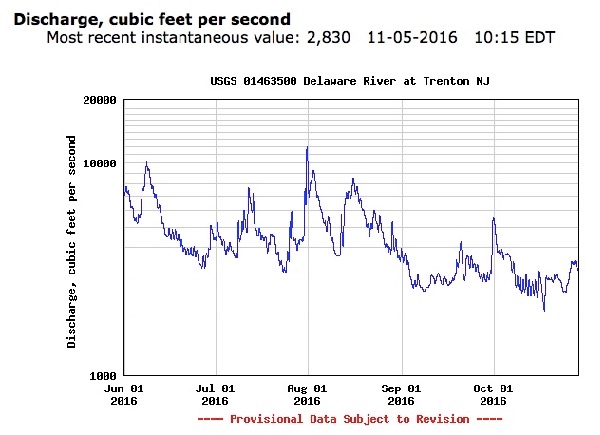Delaware River Flow Dips Below Drought Threshold
Meanwhile, watershed groups are AWOL, misfocused on voluntary feel good measures
“River Friendly” seriously distorts the science and policy picture
Drought conditions continue to worsen in the Delaware watershed, while State officials on the NJ side of the river have virtually abandoned water supply planning and are systematically weakening water resource planning and regulatory protections.
One would think that these drought conditions and the Christie DEP’s policy, planning and regulatory rollbacks of water resource protections would spur alarm, and an aggressive pushback by environmental groups, especially local and regional watershed groups.
One would be wrong.
There is virtual silence on drought conditions and – at best – muted criticism of Christie DEP rollbacks (and the muted criticism ignores the Delaware, the drought and the role of climate change).
But the reality in the lower Delaware is even worse.
In addition to ignoring drought and Christie DEP systematic rollbacks to water resource planning and regulatory protections, lower Delaware managers and watershed groups are diverting attention from these critically important problems and instead focusing on voluntary, symbolic gesture, window dressing, feel good measures that have proven to be ineffective. Magical thinking.
Today, I received this email from the Lower Delaware Wild and Scenic River Management Council, calling my attention to this presentation:
7:05 Guest Speaker, Brittany Musolino of the Stony Brook Millstone Watershed Association, talking about the River Friendly Certification Program
“River-Friendly Certification Programs promote clean water and a healthy environment through voluntary action by individuals and institutions. To achieve these goals we work one-on-one with residents, businesses, golf courses and schools to improve land stewardship practices. The program works to reduce pollution, conserve water, restore habitat for wildlife and educate the public about becoming better environmental stewards.”
In response, I fired off this note to Richard Dodds, Chair:
Richard – perhaps you might want to get a speaker to brief you on rollbacks of regulatory protections for water quality and riparian areas on the Jersey side of the watershed.
I am very concerned that all your focus on “voluntary” “stewardship” and “corporate” efforts is seriously distorting the policy picture.
When will you get a speaker with a regulatory and planning focus?
Wolfe
In the midst of drought, climate catastrophe, and regulatory dismantling, the watershed groups want to work on voluntary measures with the major creators of the problems.
And they get huge Foundation financial support for this crap – Wm. Penn Foundation ponied up $35 million for this crap.
They are looking very foolish right now – will they change their ways?
Don’t hold your breath.
